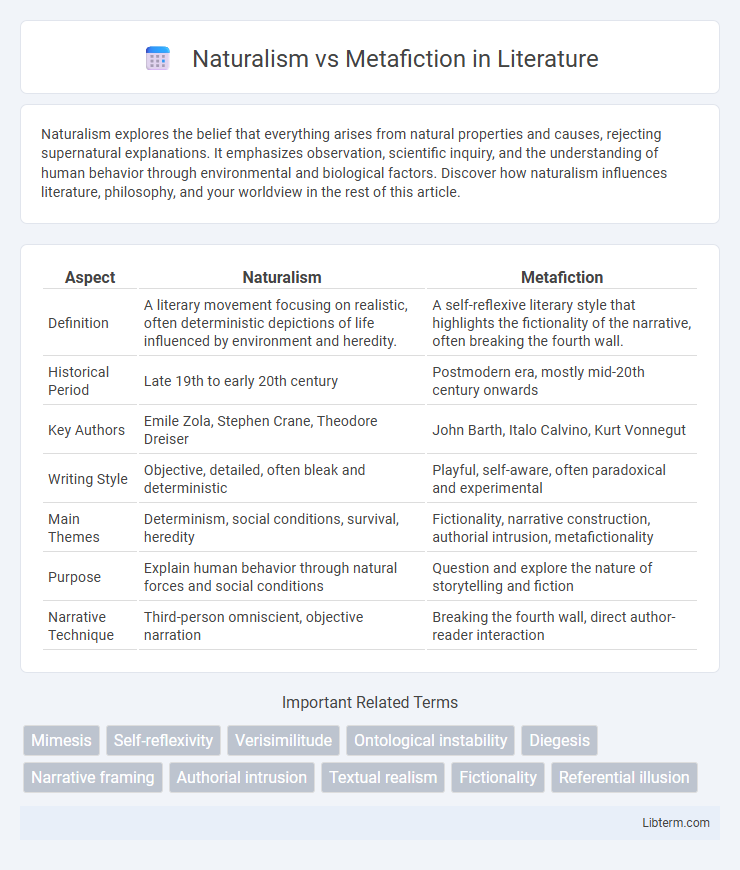Naturalism explores the belief that everything arises from natural properties and causes, rejecting supernatural explanations. It emphasizes observation, scientific inquiry, and the understanding of human behavior through environmental and biological factors. Discover how naturalism influences literature, philosophy, and your worldview in the rest of this article.
Table of Comparison
| Aspect | Naturalism | Metafiction |
|---|---|---|
| Definition | A literary movement focusing on realistic, often deterministic depictions of life influenced by environment and heredity. | A self-reflexive literary style that highlights the fictionality of the narrative, often breaking the fourth wall. |
| Historical Period | Late 19th to early 20th century | Postmodern era, mostly mid-20th century onwards |
| Key Authors | Emile Zola, Stephen Crane, Theodore Dreiser | John Barth, Italo Calvino, Kurt Vonnegut |
| Writing Style | Objective, detailed, often bleak and deterministic | Playful, self-aware, often paradoxical and experimental |
| Main Themes | Determinism, social conditions, survival, heredity | Fictionality, narrative construction, authorial intrusion, metafictionality |
| Purpose | Explain human behavior through natural forces and social conditions | Question and explore the nature of storytelling and fiction |
| Narrative Technique | Third-person omniscient, objective narration | Breaking the fourth wall, direct author-reader interaction |
Introduction: Defining Naturalism and Metafiction
Naturalism is a literary movement emphasizing realistic, detailed, and deterministic portrayals of everyday life, often highlighting social conditions and human instincts. Metafiction refers to a self-referential narrative technique that draws attention to its own artificiality, blurring the boundary between fiction and reality. Both approaches challenge traditional storytelling but differ in their focus: Naturalism centers on objective reality, while Metafiction explores the nature of fiction itself.
Origins and Historical Development
Naturalism emerged in the late 19th century as an extension of literary realism, heavily influenced by scientific determinism and the works of Emile Zola, emphasizing a detailed, objective portrayal of everyday life under social and environmental forces. Metafiction, developing predominantly in the mid-20th century, arose as a postmodern literary technique that self-consciously addresses the artificiality of fiction, with roots tracing back to early narrative experiments but becoming prominent through authors like Jorge Luis Borges and John Barth. Both movements reflect distinct historical responses to evolving literary, philosophical, and cultural contexts, with Naturalism grounded in deterministic realism and Metafiction challenging traditional narrative structures through self-reflexivity.
Philosophical Foundations: Reality vs. Artifice
Naturalism is grounded in the philosophical belief that reality is objective, observable, and governed by natural laws, emphasizing detailed, unembellished representation of life. Metafiction, on the other hand, challenges the notion of a fixed reality by foregrounding artifice and the constructed nature of narratives, questioning the boundary between fiction and reality. This contrast highlights naturalism's commitment to depicting the external world as it is, while metafiction interrogates the processes and conventions that shape storytelling itself.
Narrative Techniques and Structures
Naturalism employs deterministic narrative techniques emphasizing realistic, detailed depictions of everyday life governed by environmental and social forces. Metafiction utilizes self-referential structures that highlight the artificiality of storytelling, often breaking the fourth wall to challenge conventional narrative forms. Both approaches manipulate narrative perspective and temporality, but while Naturalism aims for immersive verisimilitude, Metafiction foregrounds narrative construction and reader awareness.
Characterization: Realism vs. Self-Awareness
Naturalism emphasizes detailed, realistic characterization shaped by environment and heredity, portraying characters as products of their social conditions. Metafiction, in contrast, foregrounds self-awareness by having characters recognize their own fictional status, often breaking the fourth wall to comment on their narrative roles. This contrast highlights Naturalism's commitment to objective reality versus Metafiction's exploration of narrative consciousness and character agency.
Representation of Truth and Fiction
Naturalism emphasizes an objective representation of reality, striving to depict life with scientific accuracy and deterministic forces shaping human behavior. Metafiction self-consciously disrupts traditional narrative structures, highlighting the artificiality of storytelling while questioning the boundaries between truth and fiction. The tension between these genres lies in Naturalism's pursuit of verisimilitude contrasted with Metafiction's exploration of narrative construction and subjective truth.
Reader Engagement and Interpretation
Naturalism immerses readers in realistic, detailed settings and characters, fostering engagement through relatable experiences and prompting interpretation grounded in social and environmental influences. Metafiction, by self-consciously highlighting its own artificiality, invites readers to actively question narrative structures and encourages interpretive participation that challenges traditional storytelling boundaries. Reader engagement in naturalism centers on emotional connection and plausibility, while metafiction demands intellectual involvement and critical reflection on the nature of fiction itself.
Notable Works and Authors
Naturalism is exemplified by authors such as Emile Zola with works like *Germinal* and Stephen Crane's *Maggie: A Girl of the Streets*, emphasizing deterministic environments and raw social conditions. Metafiction, characterized by self-referential narratives, is notably represented by Jorge Luis Borges with *Labyrinths* and John Barth's *Lost in the Funhouse*, which explore the nature of storytelling itself. Both movements challenged traditional literary structures but diverge in their approach: Naturalism grounds itself in objective reality, while Metafiction interrogates fictionality and narrative construction.
Cultural and Critical Impact
Naturalism profoundly influenced literature by emphasizing deterministic themes and social environments, shaping cultural narratives around human behavior and societal constraints. Metafiction challenged traditional storytelling, encouraging readers to question narrative reality and authorial authority, thereby transforming critical approaches to text interpretation. The cultural impact of Naturalism lies in its realistic portrayal of life's hardships, while Metafiction's critical impact fosters a self-aware, reflexive engagement with literature and media.
Conclusion: Ongoing Debates and Future Directions
Naturalism and metafiction continue to fuel ongoing debates in literary theory, challenging traditional narrative boundaries and readers' perceptions of reality. Naturalism's emphasis on deterministic, objective portrayals of life contrasts with metafiction's self-referential techniques that highlight fictionality, prompting scholars to explore the evolving function of narrative authority. Future directions in this discourse include hybrid approaches that integrate naturalistic detail with metafictional awareness, reflecting contemporary cultural complexities and shifting reader expectations.
Naturalism Infographic

 libterm.com
libterm.com